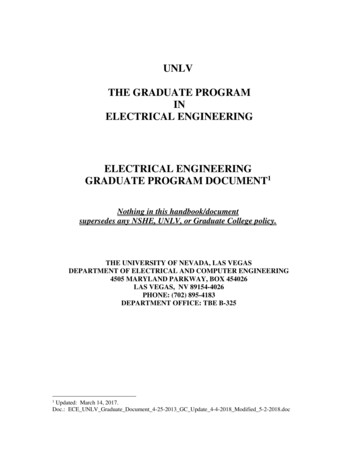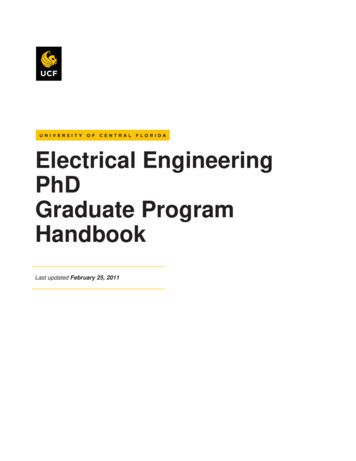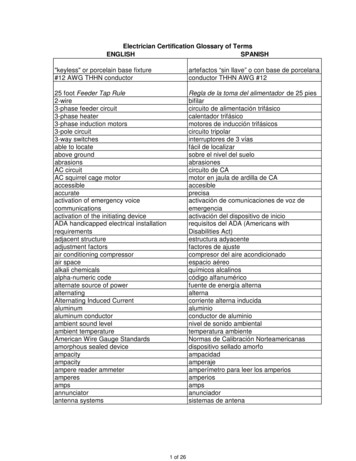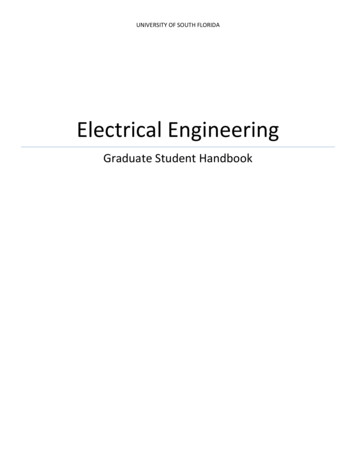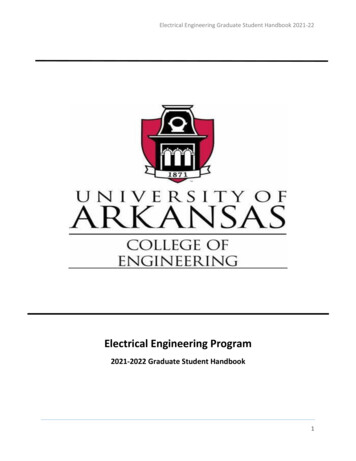
Transcription
Electrical Engineering Graduate Student Handbook 2021-22Electrical Engineering Program2021-2022 Graduate Student Handbook1
Electrical Engineering Graduate Student Handbook 2021-22Table of ContentsStatement of Nondiscrimination3Statement on Academic Integrity4Welcome from Department of Electrical Engineering Head5About the Department of Electrical Engineering6Foreword7Abbreviations Used8The Electrical Engineering Graduate Programs9General Requirements Applying to All ELEG Graduate Students10ResidencyGraduate Credit for CoursesGrievance PoliciesAcademic ProbationDismissalsThe M.S.E.E. Degree Program- Campus12Degree RequirementsOther Information Regarding Course WorkTransfer CreditRetroactive Graduate CreditChronological GuideAdvisingM.S. Readiness AssessmentSchedule of StudyResearchFinal ExaminationGraduationThe M.S.E.E. Degree Program- Global18The Ph.D. Program19Degree RequirementsTransfer CreditResidencyChronological Guide2
Electrical Engineering Graduate Student Handbook 2021-22AdvisingPh.D. Readiness AssessmentCandidacy ExaminationResearchFinal ExaminationFinancial AidAppendixLinks to Useful Websites3
Electrical Engineering Graduate Student Handbook 2021-22Statement of NondiscriminationThe Affirmative Action Plan for the University of Arkansas, Fayetteville, is designed to ensure compliancewith applicable portions of Titles VI and VII of the Civil Rights Act of 1964, Title IX of the EducationAmendments of 1972, Executive Orders 111246 and 11375, Revised Order #4, Sections 503 and 504 ofthe Rehabilitation Act of 1974, the Age of Discrimination Act of 1975, the Americans with DisabilitiesAct, the Civil Rights Act of 1991, and other federal laws and regulations which would prohibitdiscrimination in employment and education. It also helps in ensuring University compliance with thosesections of Act 99 of 1989 which pertain to employees and with the Arkansas Civil Rights Act of 1993.The Affirmative Action Policy Statement is incorporated into the University’s Affirmative Action Plan. Itprovides definitions of non-discrimination, equal employment opportunity, and affirmative action. It isthe policy of the institution to provide equal employment opportunity to all qualified persons; toprohibit discrimination against any employee or applicant for employment or education because of race,color, religion, sex, age, national origin, veteran’s status, or disability, and to promote the full realizationof equal employment opportunity through a positive, continuing program of affirmative action. Thepolicy is followed in recruiting, hiring, determination of pay, promotions, University-sponsored trainingprograms, transfers, layoffs, demotions, terminations, social and recreational programs, use ofUniversity facilities, fringe benefits, and treatment as individuals. The Office of Affirmative Actionmonitors compliance of this policy.4
Electrical Engineering Graduate Student Handbook 2021-22Statement on Academic IntegrityStudents in the Electrical Engineering Department are committed to the highest ethical and professionalconduct. As a student, you are encouraged to be honest, impartial, fair, and equal in your dealings withfellow students, faculty, and staff. Unethical conduct undermines the pursuit of the educational goals ofthis institution and this department, and erodes the honor, ability, and reputation of its graduates. TheElectrical Engineering Department at the University of Arkansas recommends that students and facultyobserve the Institute of Electrical and Electronic Engineers Code of Ethics.IEEE Code of Ethics (approved by the IEEE Board of Directors, August 1990)1. We, the members of IEEE, in recognition of the importance of our technologies in affecting thequality of life throughout the world, and in accepting personal obligation to our profession, itsmembers and the communities we serve, do hereby commit ourselves to the highest ethical andprofessional conduct and agree:2. To accept responsibility in making engineering decisions consistent with the safety, health, andwelfare of the public, and to disclose promptly factors that might endanger the publicenvironment;3. To avoid real or perceived conflicts of interest whenever possible, and to disclose them to theaffected parties when they do exist;4. To be honest and realistic when stating claims or estimates based on available data;5. To reject bribery in all of its forms;6. To improve understanding of technology, its appropriate application, and potentialconsequences;7. To maintain and improve our technical competence and to undertake technological tasks forothers only if qualified by training or experience, or after full disclosure of pertinent limitations;8. To seek, accept, and offer honest criticism of technical work, to acknowledge and correct errors,and to credit properly the contributions of others;9. To treat fairly all persons regardless of such factors as race, religion, gender, disability, age, ornational origin;10. To avoid injuring others, their property, reputation, or employment by false or malicious action;11. To assist colleagues and co-workers in their professional development and to support them infollowing this code of ethics.Strict adherence to the foregoing Code of Ethics is a requirement for graduation from the departmentand the College of Engineering. The complete College of Engineering policy on Academic Ethics isincluded in the Catalog of Studies. Please refer, also, to the section entitled “Academic Regulations” inthe Catalog of Studies.5
Electrical Engineering Graduate Student Handbook 2021-22Welcome from Head of the DepartmentThe University of Arkansas at Fayetteville, a state land grant university, has emerged as a nationallycompetitive, student-centered research university serving Arkansas and the world in a competitiveglobal environment. The Department of Electrical Engineering contained within the College ofEngineering is one of the most research active departments within the University. The department’stalented faculty and dedicated staff have developed a high-quality graduate program to fulfill theprofessional development aspirations of bright and hardworking students. Particular areas of emphasisare on finding new ways to capture the sun’s rays, enhancing the reliability of the power grid, protectingthe electric grid from cyber-attacks, developing new power modules for high power electronics,researching new ways to detect breast cancer, developing new electronic materials, and using theproperties of light to develop new night vision and laser technology.The department revolves around professional, qualified educators providing quality education to ourstudents including hands-on experience at state of the art laboratory facilities, beneficial work, andadvanced leadership opportunities complemented by entrepreneurship training offered by otherdepartments.The goals of the Department of Electrical Engineering departmental are enhancing and developingprograms of excellence in education, research, and service to the state, the nation, and the world;increasing the size and the quality of our student body; enhancing diversity among our faculty, students,and staff; increasing financial responsibility of the unit and increasing public financial support providedby state and other funding sources; increasing private gift support from our alumni and friends;providing opportunities for co-op, interns, training, and employment of our graduates in a competitiveglobal market; ensuring success of our students on all levels and professional studies in key potentialtechnical areas; producing graduates able to pursue life-long learning and continued professionaldevelopment, capable of undertaking leadership roles in their profession, in their communities, and inthe global society; and increasing research funding from government agencies and a wide variety ofindustries to promote our graduate program.For over 100 years, the Department has grown its graduate teaching and research missions into atradition of excellence and achievement as attested by internationally-recognized research centers.6
Electrical Engineering Graduate Student Handbook 2021-22About the Department of Electrical EngineeringThe Department of Electrical Engineering at the University of Arkansas was established in 1897. Our EEprogram at the University of Arkansas has been offering B.S. degrees for over 100 years and has beencontinuously accredited since 1936. We were one of the first programs in the nation to meet the ABETaccreditation standards (criteria 2000). In addition to the Bachelor’s Degree (B.S.E.E.), the departmentalso offers the Master’s Degree (M.S.E.E.) and the Doctoral Degree (Ph.D.). The Department has a totalof 20 tenured and tenure-track positions within the department.Areas actively pursued are Biochemical, Communications, Computers and Digital Circuit Design, ControlSystems, Electric Energy Systems, Electronic Circuit Design, Micro-Electronics/ Photonics, NanoTechnology and MEM’s, Packaging, Pattern Recognition and Artificial Intelligence, Power, RF andMicrowaves, and Semiconductor Devices and Integrated Circuits.The High Density Electronic Center (HiDEC) has extended its mission to be A Center of Excellence forNano-, Micro-, Bio-, and Neuro-Electronics, Sensors and Systems with six Research faculty members. Forover 100 years we have been integrating a tradition of excellence and achievement with our goals forthe future. The electrical engineering graduate is at the forefront of technology leading to the dramaticincrease in global communications, the accelerated use of electric power and efficient energy sources,the dominating influence of the computer on modern society, and an impressive host of moderninnovative developments. There is wide-spread and expanding use of electronics and electronicequipment for measure and control spreading into diverse areas such as improved healthcare,transportation, traffic control, recreation, computing, agriculture, marketing, manufacturing, education,and numerous other areas and fields.This expanding use of electronics and electronic equipment has resulted in electrical engineering beingthe largest of all scientific disciplines, thus assuring a continued demand for electrical engineeringgraduates throughout business, industry, and government. Our students are our pride and also ourfuture, and they continue to be in high demand in a competitive hiring market. Recent employers ofElectrical Engineering Department graduates include the following companies: Alltel, Raytheon, Entergy,MCI World Com, Sprint, Lockheed Martin, HP, Texas Instruments, Hughes, Northrop-Grumman, Intel,Baldor, Anderson Consulting, Motorola, Exxon, Dow, Whirlpool, National Semiconductor, and IntegratedDevice Technologies.7
Electrical Engineering Graduate Student Handbook 2021-22ForewordThis Graduate Student Handbook provides detailed statements of the requirements for all graduatedegrees offered by the Department of Electrical Engineering, and the descriptions of the procedures tobe followed in completing the requirements of each degree program.The Graduate School publishes The Graduate Catalog which states the various Graduate Schoolrequirements and regulations they apply to graduate students in all departments. An attempt has beenmade in the Electrical Engineering Graduate Student handbook to include all ELEG regulations andrequirements that apply to ELEG graduate students together with many of the most commonlyencountered Graduate School regulations from the Graduate Catalog. In some instances ELEGrequirements are more stringent than those of the Graduate School and in these instances the morestringent requirements apply. If any ELEG regulations violate those of the Graduate School, GraduateSchool regulations take precedence. It is the responsibility of students to consult both the GraduateSchool Catalog and this manual when planning or revising their program of studies.If there are any doubts regarding the interpretation of any regulation or requirements in thus manual, orif there are any questions about the graduate program involving matters not covered in this manual,please consult the ELEG Graduate Advisor and Chairman of the ELEG Graduate Studies Committee Dr.Jingxian Wu at wuj@uark.edu, or the Graduate Secretary Hannah Claire Franklin at (479) 575-3005 orgradinfo@uark.edu, BELL 3217.8
Electrical Engineering Graduate Student Handbook 2021-22AbbreviationsIn the interest of brevity, the following abbreviations are used in this manual:ELEGElectrical Engineering, the Department of Electrical Engineering, and the prefix forcourses offered by the Electrical Engineering departmentGSCDepartment of Electrical Engineering Graduate Studies CommitteeCGSCChairman of the ELEG Graduate Studies Committee and Coordinator of ElectricalEngineering Graduate ProgramsGrad SchoolThe Graduate School and International Admissions Office of the University of ArkansasM.S.E.E.Master of Science in Electrical EngineeringPh.D.Doctor of Philosophy in Electrical Engineering as granted by the Department of ElectricalEngineeringCSCEPrefix for courses offered by the Computer Science Computer Engineering Department9
Electrical Engineering Graduate Student Handbook 2021-22Electrical Engineering Graduate ProgramsThe Electrical Engineering Department of the University of Arkansas offers three graduate programs:Master of Science in Electrical Engineering, M.S.E.E.Master of Science in Electrical Engineering, M.S.E.E. Global Campus: emphasis in Power and/or ControlDoctor of Philosophy, Ph.D.The M.S.E.E. is a generalized Electrical Engineering degree with the maximum freedom to tailor theprogram to fit the student’s interests in the various areas of Electrical Engineering. The candidate forthe M.S.E.E. is required to complete a minimum of 24 semester hours of course work and 6 hours ofthesis or 30 semester hours of course work and no thesis.The M.S.E.E. offered through the Global Campus provides distance education in the broader fields ofcontrol systems, management, and power engineering for mainly working individuals. This M.S.E.E. hasthe same requirements of hours, however most students choose the non-thesis option due to thenature of distance education. There is opportunity for customization, and most students find it meetstheir unique needs.The Ph.D. degree is awarded in recognition of high scholarly attainments as evidenced by a period ofadvanced study, the satisfactory completion of certain prescribed examinations, and the developmentof a dissertation covering original research in Electrical Engineering.10
Electrical Engineering Graduate Student Handbook 2021-22General Requirements for All Electrical Engineering Graduate StudentsResidency: Enrollment RequirementsUnder various circumstances, a graduate student must maintain full-time status. These include, but arenot limited to:International students on F-1 student visasStudents on graduate assistantshipsStudents on certain other types of financial aidM.S. students hoping to transfer credit hours from another accredited U.S. Graduate School (SeeM.S.E.E. section for more information)The U.S. Immigration and Naturalization Service requires all graduate level international students toenroll in nine or more hours per semester to maintain their immigration status. The only exceptions are:summer vacation, medical illness, severe language difficulties the first semester the student is onassistantship, or all required course work is completed and the student is making full-time progresstowards a thesis, dissertation, or comprehensive exams. Please note that financial difficulties are not avalid reason for failing to maintain full-time status.Graduate Assistantships (GAs) require a minimum and a maximum number of hours depending on thelevel of the appointment. This information is found in the appendix. Most GA’s have a 50%appointment and must enroll in a minimum of six semester hours during the fall and spring terms andthree credit hours for the summer term.Graduate Credit for CoursesSenior (4000 level) and graduate (5000 and 6000 level) courses may be taken for graduate credit if theyare listed in the current Graduate School Catalog. The catalog is found at http://catalog.uark.edu/. Thestudent should check the courses in the catalog before planning his schedule of study and enrolling inthem.3000-level courses may be taken for graduate credit if they are not ELEG courses and they have beenapproved by the Dean of the Graduate School for graduate credit before the Official Enrollment Report(usually the 11th day of class.) The student’s major professor must recommend the course, and theinstructor must agree. The instructor for the course must hold graduate faculty status and must certifythat he/she will make appropriate adjustments in assignments and grading scales to raise the level ofexpectation for the student to the graduate level.* Students should use the Graduate Credit for 30004000 Level Courses found on the Graduate School website. No more than 20% of the gradedcoursework in the degree program may be comprised of 3000-level courses carrying graduate credit.11
Electrical Engineering Graduate Student Handbook 2021-22Grievance PoliciesThe Academic Grievance Procedures for Graduate Students is explained in detail in the GraduateCatalog. It covers the procedures for Graduate Students, Graduate Assistants, and Research andScholarly Misconduct Policies and Procedures. If the student has a grievance against another student oranother employee of the University, or if the student has a grievance which is not academic in nature,the appropriate policy may be found by contacting the Office of Affirmative Action or the office of theGraduate Dean. For policies and procedures pertaining to conduct offenses, consult the Code of StudentLife.*Academic ProbationWhenever a regularly admitted graduate student earns a cumulative grade-point average below 2.85 ongraded course work taken in residence for graduate credit, he/she will be warned of the possibility ofacademic dismissal. When a graduate student has accumulated a minimum of 15 hours of graded coursework taken in residence for graduate credit with a cumulative grade-point average below 2.85, and hasreceived at least one warning, he/she will be academically dismissed from the Graduate School. Thestudent’s degree program may request that the academic warning period be extended if the programcan offer extenuating circumstances as a rationale and is willing to provide a plan of remediation for thestudent’s success. The complete policy is detailed in the Graduate Catalog.In addition to the policy for probation determined by the Graduate School, a student who makes a gradeof C or below in more than three semester hours of graduate work will be placed in departmentalprobation. (What does this entail?)DismissalsGraduate degree programs have the right to dismiss graduate students who do not make adequateacademic progress or engage in illegal, fraudulent, or unethical behavior as defined in any of theUniversity codes or policies pertaining to academic and research integrity. There may also be otherunusual situations in which a student may be dismissed from a degree program. The complete policyand procedure is detailed in the Graduate Catalog.The department policy is that a student who makes a grade of C or below in more than six semesterhours of graduate course work will be dismissed from the MSEE program.12
Electrical Engineering Graduate Student Handbook 2021-22The M.S.E.E. Degree ProgramDegree RequirementsCandidates for the MS degree who present a thesis are required to complete a minimum of 24 semesterhours of course work and six semester hours of thesis. Candidates who do not present a thesis arerequired to complete a minimum of 30 semester hours of course work. Of this course work, a minimumof 12 semester hours must be 5000- or 6000-level Electrical Engineering. At least 15 hours for thesisstudents and 21 hours for non-thesis students graduate course work must be Electrical Engineering.Other Information Regarding Course WorkELEG 588V Special Problems may only account for six hours towards the degree. Students whocomplete a BSEE at the University of Arkansas, Fayetteville, with a GPA of 3.5 or greater may count up tosix hours of Electrical Engineering graduate-level course work completed as an undergraduate studenttowards the MSEE degree.Transfer CreditA maximum of six semester hours of course work may be transferred from another institution within theUnited States towards the MSEE. Certain criteria must be met and are listed in detail in the GraduateSchool’s Student Handbook. The Transfer Credit Form also lists the criteria and may be found on theGraduate School website. Transfer of credit from an institution outside of the U.S. is generally notaccepted but may be considered on a case by case basis. Question- can transfer credit apply to ELEGcourse requirements?A student who received a BS at the University of Arkansas may petition to have up to six hours ofgraduate level courses that were taken during the last semester of the BS but were not used for the BSapplied to the MSEE. Students who completed a BSEE at the University of Arkansas, Fayetteville, with aGPA of 3.5 or higher may count toward the MSEE degree up to six hours of ELEG graduate level coursework completed as an undergraduate student (commonly called “double-dipping.)The M.S.E.E. degree will allow transfer of up to nine credit hours of graduate level course work fromuniversities with which the University of Arkansas has a "1 1" M.S.E.E. exchange program. Each coursetransferred must be graduate level and must be approved for transfer by the Electrical EngineeringGraduate Committee. The transferred courses will not count toward the M.S.E.E. requirement for 5000or 6000- level ELEG courses.Retroactive Graduate CreditGraduate students fully admitted into a degree program at the University of Arkansas may request thatup to twelve hours of courses taken in the final twelve month period of their undergraduate degree13
Electrical Engineering Graduate Student Handbook 2021-22count toward their graduate degree, if these courses were taken on the University of Arkansas,Fayetteville campus. These courses may not have been used for the undergraduate degree (unless thestudent is in a program where this has been approved by the Graduate Council), must be approved bythe student’s advisory committee, and must be at the 5000 level or above. Petition will be by thestudent’s advisory committee or major professor to the Graduate School.Chronological GuideThe main steps for completing the MSEE degree requirements are listed in this section. Whennecessary, a step may be discussed in greater detail in the sections that follow. Required forms may befound at the Graduate School website and are linked on the ELEG website for convenience.1. The student must choose an adviser if he/she was admitted without one. The CGSC may serve as theacademic advisor initially until a permanent one is found.2. Form the advisory committee. You must choose an advisory committee before the end of your firstsemester of work. You advisory committee will oversee your work and exams. Your major advisor is thechairman of your advisory committee. You need to consult with your major advisory to select youradvisory committee members. Fill out an Advisory Committee form and submit it to the ElectricalEngineering department. If the advising committee members are the same as the thesis committeethen one form may be used for both committees.3. Take the MSEE Readiness Assessment. Candidates for the M.S.E.E. degree must take an M.S.Readiness Assessment exam during their first semester of graduate work. This exam is administered bythe student’s major professor, and is designed to assess the student’s undergraduate preparation for hisor her graduate work. The student may be required to take whatever undergraduate courses aredeemed necessary in addition to the graduate courses specified in items 1-3. Fill out an MSEE ReadinessAssessment form and submit it to the Electrical Engineering department.4. Plan your schedule of study. You, along with your major advisor and advisory committee, will chooseall your courses for the master's degree. You should plan to choose these courses during your firstsemester. You need to do this to avoid missing a course that is only offered once every two years. TheTwo-year Tentative Schedule of Graduate Courses shows when each course will be offered. Fill out aSchedule of Study form and submit it to the Electrical Engineering department. Global students shoulduse the MSEE Online Schedule of Study form.5. Choose a Thesis Committee. If you are completing a thesis as part of your degree, you must choose athesis committee. Your thesis committee will rate your thesis as your final exam. Your major advisor isthe chairman of the committee, and will help select its members. Fill out a Thesis Committee form andsubmit it to the Electrical Engineering department. If the thesis committee members are the same asthe advising committee then one form may be used for both committees.14
Electrical Engineering Graduate Student Handbook 2021-226. Decide the theses title. If you are completing a thesis as part of your master's work, you must decideon the title of your research work. Fill out a Thesis Title form and submit it to the Electrical Engineeringdepartment. You should do this at least one semester before you present your thesis.7. Apply for Graduation.8. Schedule and announce your final exam. You must announce your exam to the Electrical Engineeringdepartment. Fill out the Announcement of Final Exam form and submit it to the Electrical Engineeringdepartment. You should do this about a week before your exam. If you are a thesis student, your thesisdefense is your final exam. If you are a non-thesis student, you must take a Comprehensive Exam infront of your committee.9. Complete final exam.10. Submit thesis. The Title Page with original signatures, the Intellectual Property Disclosure Form, andthe Thesis Submission Form are turned in to the Graduate School by the student. The Dean of theGraduate School is the only person who may sign by proxy for an out of state professor and mustreceive authorization form that professor. If the student is unable to submit the thesis in person, he/shemay authorize someone else to do it for them. The Department requires an electronic copy of the thesisfor its records.11. The Record of Progress must be completed by the Advisory Committee and turned in to theGraduate Secretary. The Graduate Secretary must deliver the ROP to the Graduate School.12. Graduate.AdvisingPrior to the second semester the student must choose a professor who will then serve as his or hermajor adviser and primary supervisor of graduate work. A student chooses an adviser by talking toprofessors in his/her area of interest and requesting one of them to serve in that capacity. If the facultymember declines, the student should then choose another. If a student cannot find a major professor,the student should discuss the matter with the CGSC.After a major professor is identified, the student and adviser will choose the Advisory Committee. Thecommittee consists of the major professor and at least two other members of the graduate faculty. Atleast two members of the Advisory Committee must be Electrical Engineering faculty. Committeemembers must hold graduate faculty status of Group 3 or above or adjunct faculty status. Ex officiomembers, as additional members, may or may not hold graduate faculty status. They may sign thethesis and vote, however the vote will not be binding for conferring the degree.15
Electrical Engineering Graduate Student Handbook 2021-22Once the committee is formed, the student must submit the Master’s Committee Form. The student isresponsible to collect the signatures. Global students may submit the committee form withoutsignatures, and the Graduate Secretary will obtain the members’ signatures.To register for classes, the student begins by consulting with his/her major professor to decide whichcourses to take. The major professor must remove the advising hold in UAConnect before the studentwill be able to enroll in classes. Campus students then self-enroll with UAConnect. Global students havea different enrollment process, which will be addressed in a later section.A student may change his/her major professor by finding another professor to serve in that capacityonly if the current major professor approves the change. The student should realize that after aprofessor has made a financial investments in him/her by paying a graduate assistantship it is unlikelythat the professor will agree to release the student before the thesis work is completed. To do so wouldwaste the money the professor has invested in the student and would be a disservice to the sponsorwho provided the funding. If the professor does agree, then he or she must resign from the committeevia email to the Associate Dean of the Graduate School. The student should realize that in addition tosubmitting a new committee form to the Graduate School, a new schedule of study must be completedand filed with the department and additional courses may be required.If the student is primarily taking deficiency courses, selecting a major adviser may be delayed until thestudent begins course work for the degree.M.S.E.E. Readiness AssessmentEach MSEE student is required to complete a formal MSEE Readiness Assessment administered byhis/her adviser or advisory committee during the first semester of his/her MS work. The MS ReadinessAssessment exam a) may be oral and/or written, b) should be in as much depth as the adviser oradvisory committee considers useful and necessary for the topic, and c) should cover all subjects thatthe adviser or advisory committee considers import
Electrical Engineering Graduate Student Handbook 2021-22 9 Abbreviations In the interest of brevity, the following abbreviations are used in this manual: ELEG Electrical Engineering, the Department of Electrical Engineering, and the prefix for courses offered

